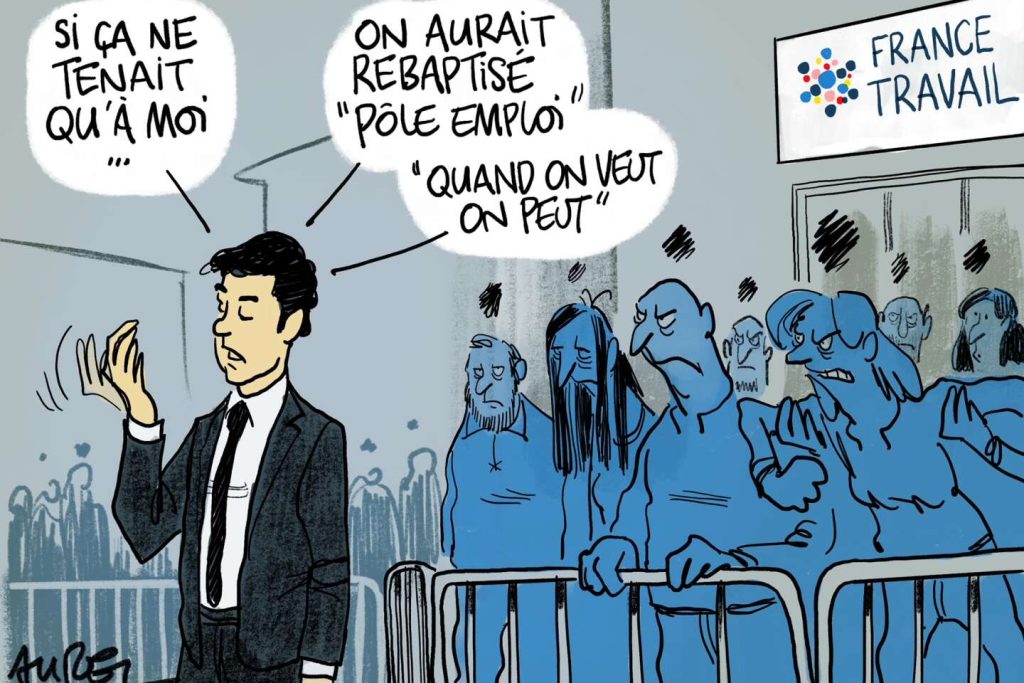After working in human resources for over twenty years, Dominique finds himself on the other side, as a job seeker, following an economic layoff in November 2023. Despite the initial shock of losing his job and a brief unsuccessful experience earlier in the year, this 55-year-old former recruitment manager now treats his daily routine as if it were a real workday. From dawn, Dominique meticulously goes through job offers, applies to some, follows up with recruiters, attends interviews, and stays informed about topics relevant to his industry, such as artificial intelligence. At the end of each day, he documents all his activities on his computer to avoid feeling unproductive, and prepares a to-do list for the following day. Despite his excessive approach, Dominique is determined to find a new job.
When Prime Minister Gabriel Attal announces a new reform of unemployment benefits and increased controls to encourage job reintegration, citing that work should always pay better than inactivity, Dominique questions whether the government considers the psychological impact of unemployment. He emphasizes that being jobless does not mean being idle and waiting out the situation, as work plays a crucial role in structuring an individual’s life. Without a job, one can feel marginalized in society. The Prime Minister’s proposal to toughen the rules of unemployment benefits by reducing indemnity duration, amount, or increasing required work hours for eligibility is seen by many job seekers as an additional hurdle on an already challenging path.
Anne-Laure, who is unemployed and receiving the Revenu de Solidarité Active (RSA), criticizes what she perceives as a discourse that blames the most precarious individuals. Feeling a lack of proper support and follow-up from France Travail, this 60-year-old former editorial secretary rejects the idea that there is meaningful assistance for those in need. Despite her lack of experience in accounting, her advisor suggested a position as a chief accounting officer, and later steered her towards a training program to become a security agent for the Olympics. Despite feeling mismatched with these options, she accepts it with a sense of resignation, viewing it as a means to work. The government’s approach towards job seekers like Anne-Laure has left many feeling undervalued and misunderstood.
The proposed reforms to the unemployment system have sparked a debate on whether the government adequately considers the human aspect of job loss and reintegration. Some argue that strict regulations and increased pressure on job seekers may lead to further stress and feelings of inadequacy, especially for those already struggling with the challenges of unemployment. As the government pushes for a system that encourages rapid reemployment, it is essential to balance economic considerations with the well-being of individuals facing job insecurity. The voices of those directly impacted by these policies, like Dominique and Anne-Laure, shed light on the complex realities of navigating the job market in an ever-changing economic landscape.
In conclusion, the experiences of individuals like Dominique and Anne-Laure highlight the emotional toll of unemployment and the challenges faced by those seeking to reenter the workforce. As the government introduces new reforms to tighten unemployment benefits and increase controls, there is a growing concern about the lack of holistic support for job seekers. While the push for reemployment is crucial for economic recovery, it is important to recognize the psychological impact of job loss and the need for comprehensive assistance programs. By listening to the voices of those affected by these policies and fostering a more empathetic approach to unemployment, policymakers can create a more inclusive and supportive environment for individuals navigating the uncertainties of job seeking.


